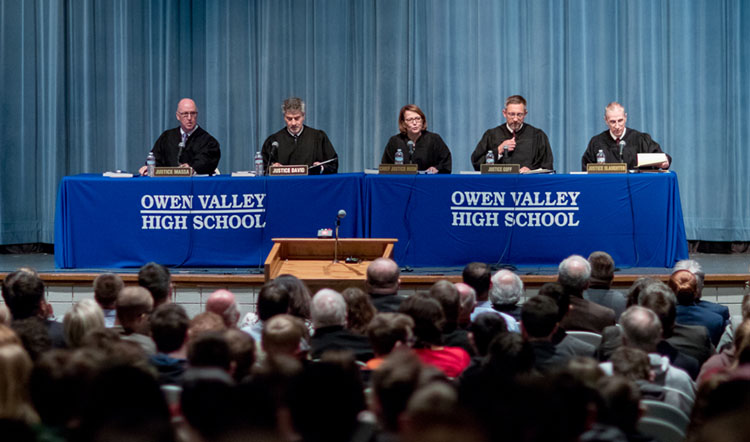
By Rachel Anderle | Communication Intern, Office of Communication, Education, and Outreach
On April 20, the Indiana Supreme Court heard an oral argument in Spencer at Owen Valley High School, rather than in the Supreme Court Courtroom in Indianapolis. The Court schedules arguments twice a year outside the capital to allow students, press, and public in other areas of the state the opportunity to see the work of the Court and to teach students about the judicial process.
Since 1994, the Court has held 43 arguments on the road. The Court chose to travel to Owen County because it is one of only 17 counties that had not previously been visited by any of the appellate courts.
The Court heard argument in a juvenile delinquency case, J.W. v. State of Indiana, in front of nearly 600 guests including students from eight area schools:
- Bloomfield Jr/Sr
- Clay City Jr/Sr
- North Putman HS
- Northview HS
- Owen Valley HS
- Shakamak Jr/Sr
- South Putnam HS
- White River Valley HS
Following the argument, the Court answered questions from the students.
A sophomore asked Justice Geoffrey Slaughter how his business school background affects his work on the Supreme Court. Justice Slaughter explained that while he does not use his Finance degree often in his day-to-day work, having an additional area of study is helpful. “It is not so much the substance of the area you study, as much as the critical thinking skills you acquire. That is the essence of education.”
A junior asked how the justices are able to reconcile their different points of view on cases. “One of the things that has been very impactful for me is just how kind and respectful my colleagues are when they disagree,” Justice Christopher Goff said. “I think that’s very intentional because we have a lot of unkindness in the world today. I think the Court wants to reflect the fact that we need to be okay with disagreement, and we need to remain civil.”
Chief Justice Loretta Rush agreed, “We look at each other’s suggestions, without ego, and try to determine how we can get the best result for our state.”
“If you have an opinion, that’s great, but you need to know how to listen,” Justice Steven David added. “And we are very capable listeners.”
Members of the audience asked questions for over 30 minutes, including how the Chief Justice is chosen, how cases are chosen for oral argument, and how many cases the Court hears and decides each year.
“I have been on the Court for six years, and we do this a couple times a year, but I have never heard such a breadth of quality questions as we heard today,” Justice Mark Massa said, thanking the students for their attention and preparation.